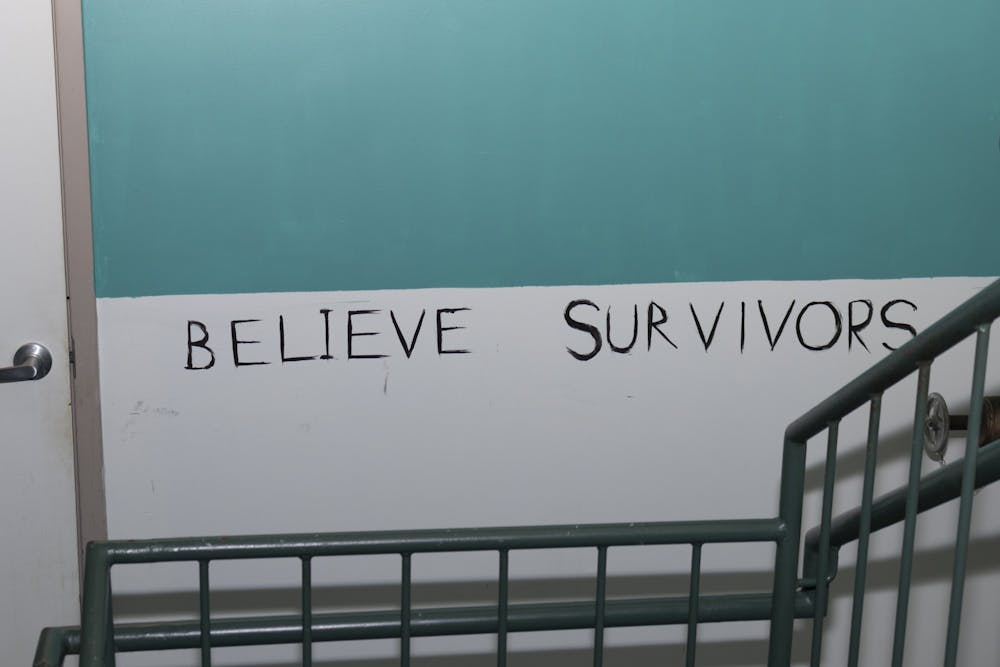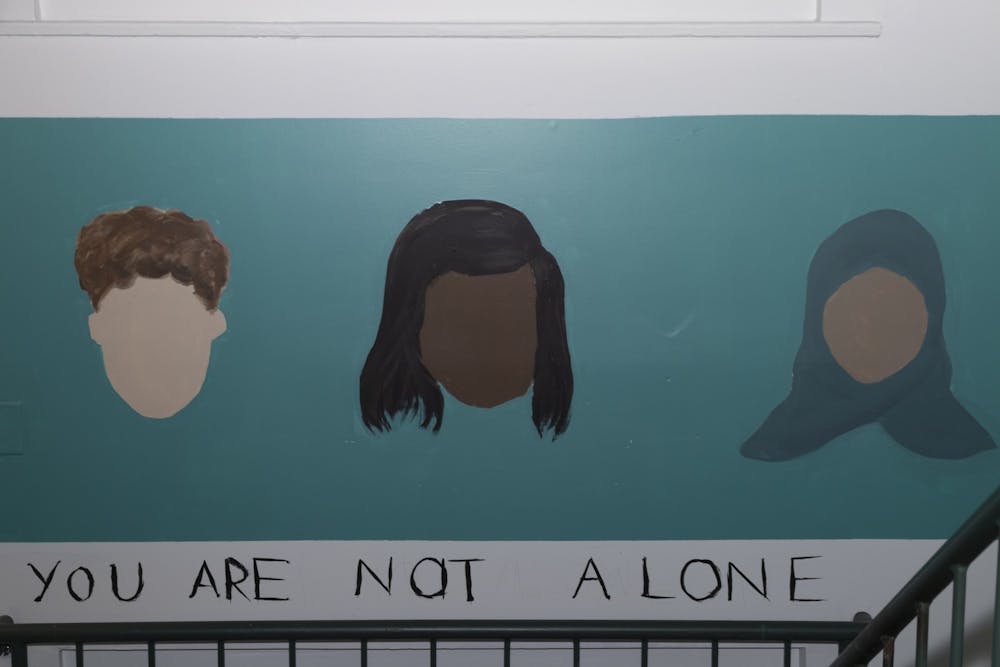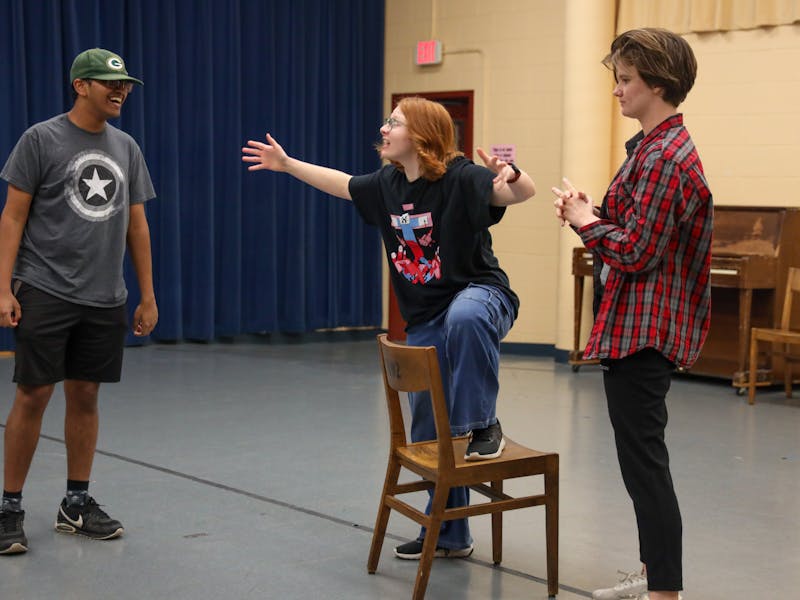Edit: On October 21st, 2021, the Faculty Principal of Carolina International House at Maxcy and Thornwell Colleges notified Garnet & Black that there are no plans to paint over the mural at Maxcy College. The student created mural from last year will not be erased, covered, or changed in any way.
In light of the “Fire Voros” movement, news of UofSC history professor and faculty principal of Maxcy College, Dr. David Snyder, sexually harassing a student from 2018 up until 2020 had come forward earlier this year in March. In an article by FITSNews, UofSC alumni Mary Elizabeth Jones had filed a lawsuit against Snyder and described, in detail, what he had done to her. Jones had also explained what UofSC had done with the situation in which she said she felt like, “the problem.” Once this article came out, five students from UofSC, some of whom used to live in Maxcy College and were very close to Snyder, felt unsettled after reading the news about their former faculty principal. The students were rather disappointed to also find out nothing was going to happen to Snyder.
In April, the five USC students broke into Maxcy College and proceeded to paint a mural on one of the stairwells. What was the mural? A tribute to victims of sexual harassment and abuse. On the walls, it said things such as, “BELIEVE SURVIVORS,” “YOU ARE NOT ALONE,” as well as the National Sexual Assault Hotline number and the on-campus hotline number. Now, with the University planning to paint over the mural, these students want to immortalize their work somehow, and have decided to do an anonymous interview with Garnet and Black to talk about the Dr. Snyder allegations and why they responded the way they did.*

Their initial feelings when they first read the article was shock, they had no idea how to feel or say about it. “We were shocked because it was someone so close to us,” one of the students said. “It was someone we lived with. It was someone who had access to our homes.” Three out of the five students who had painted the mural used to live in Maxcy College their freshman year and they talked about how often they were alone with Snyder and talked to him about personal things. They trusted him and looked up to him, so upon hearing the news they were distraught, but they knew they had to do something.
When asked why they painted the stairwell specifically, one of the students who used to live in Maxcy said that the stairwell was something that meant a lot to all of them. The student heard that Snyder was originally planning to hire an artist to paint the stairwell but due to COVID-19, the plan fell through. The group decided to take that opportunity. “We wanted one part of Maxcy to have nothing to do with him,” one of the students said. “We were angry. We wanted to make something that said, 'this is a real problem. Look at this.” While painting the mural, they had the intention of keeping it positive, not wanting to slander Snyder nor Maxcy College in any way. They wanted to make it all about the victims, not the abusers. They wanted to reassure victims of sexual abuse that they are not alone.
“It’s already hard enough to report something like this,” one of the students said. They explained how difficult it is to reach out to the University and how UofSC has almost done nothing with reports of sexual abuse. Victims of professors on campus are especially vulnerable due to the superiority held over them. “They have control over your grades,” the student explains. “If the university doesn’t believe you, then you have this professor who doesn’t like you anymore.”
Another student, who has no affiliation with Maxcy College, was asked why they decided to participate in painting the mural, especially with the consequences it had and bravely, they talked about their own personal experience with sexual assault. They talked about feeling as though it was their fault—if they had, “said no ten more times then maybe it would’ve done something.” But it wasn’t until years later that they realized it was not their fault at all. They want to make it known that although the University is known for not doing much when it comes to sexual assault, there are counseling and psychiatric services available to students who have experienced those traumas.

The mural in Maxcy College is not just a response: it’s a message. A message to those who are victims of sexual abuse. It’s a way to say, “We see you. We hear you. You are not alone.” It’s a positive message to reinforce that as UofSC students, everyone has a voice, and they use that voice for those who can’t. The mural is a symbol of activism, of sticking together and advocating for each other. Unfortunately, as mentioned before, the University is planning to paint over the mural.* “We think it isn’t right to paint over it. We didn’t do anything disrespectful,” a student said. The students aren't surprised the University will paint over it, they are actually surprised they haven’t done it yet. The students explained that if the University paints over the mural, then they will be painting over sexual assault resources that students could need. “We painted things that people need to hear. We want people to know someone is listening to them. We are listening to them.”
Why do these things keep happening? In some way, the University always tries to sweep these allegations under the rug. In the David Voros case, Allison Dunavant had filed a complaint toward Voros but UofSC had concluded there was not enough evidence that proved Voros had gone against school policy. Dunavant and Jones (from the Snyder allegations) both express their feelings of frustration with the University and how let down they felt. What makes matters worse is that both David Voros and David Snyder are still employed by the University and make just as much as they did before the allegations. It’s disheartening to victims of sexual abuse to see that abusers being protected, as it makes them seem basically untouchable.
Some final thoughts the students wanted to give is that if they’re scared to go to the University for help or feel as though they will be let down, there are people who are here willing to listen to them and help them. “It’s never the victim’s fault. In any way. The 'what-ifs' don’t matter, it’s never the victim’s fault.”
If you or anyone you know is a victim of sexual abuse, assault, and/or harassment, here are a few resources:
National Sexual Assault Hotline: 1-800-656-4673
Sexual Assault and Violence Intervention and Prevention Hotline (On Campus): 803-777-8248
https://sc.edu/safety/interpersonal-violence/contacts/index.php



